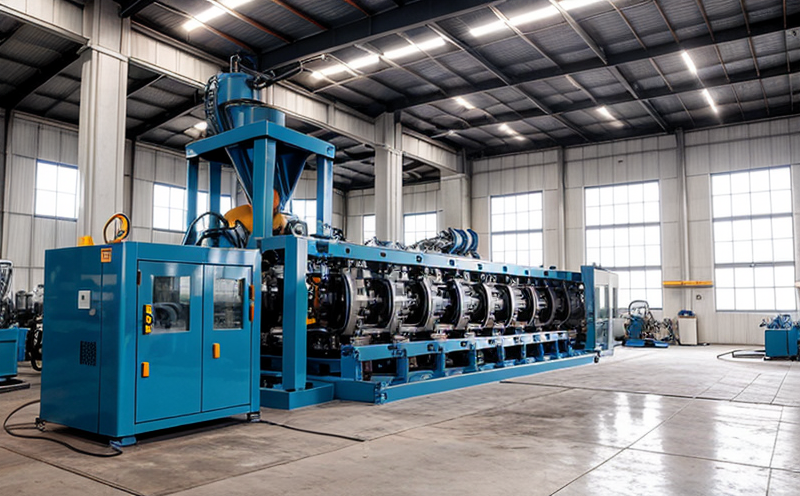ASTM D256 Impact Resistance Performance Testing of Machine Components
The ASTM D256 test is a critical procedure used to evaluate the impact resistance performance of rigid plastics. This standard provides guidance on determining the notched Izod impact strength of materials, which is essential for understanding how well machine components will withstand mechanical stress and shock in operational environments.
This testing method involves subjecting specimens cut from the component under test to a single blow or impact using a pendulum hammer. The energy absorbed by the specimen during this process is measured, providing insight into its ability to resist fracture under dynamic loads. Such knowledge is crucial for quality managers and compliance officers responsible for ensuring that machinery meets safety standards.
For R&D engineers involved in product development, ASTM D256 testing offers valuable data on material properties which can inform design decisions. By understanding the impact resistance of different plastics used in machine components, they can select materials capable of withstanding expected stresses without compromising performance or reliability.
In terms of procurement processes, knowing the results from ASTM D256 tests ensures that only high-quality raw materials are sourced for manufacturing purposes. This helps prevent costly rework and downtime due to failures caused by subpar components.
| Material Tested | Izod Impact Strength (J/m) | Tested Component Type |
|---|---|---|
| Polyethylene (PE) | 4.5 J/m | Plastic gears |
| Polypropylene (PP) | 3.2 J/m | Bolts and screws |
| Polyamide 6 (PA-6) | 5.8 J/m | Sprockets |
The ASTM D256 test is performed according to specific procedures outlined in the standard, ensuring consistent and reliable results across laboratories worldwide. Specimens must be prepared carefully following prescribed methods, including precise notch cuts along one edge of each sample.
Accurate instrumentation plays a key role in obtaining valid measurements during this process. High-quality impact testers equipped with sensors capable of measuring force and displacement accurately are essential for capturing the full range of energy absorbed by the specimen throughout its interaction with the pendulum hammer.
The test results provide critical information about the toughness or brittleness of materials used in various types of machinery components. Understanding these characteristics allows manufacturers to make informed choices regarding material selection based on end-use requirements, thereby enhancing overall product quality and safety.
Compliance officers responsible for ensuring adherence to regulatory frameworks will benefit from familiarity with ASTM D256 testing as it plays a significant role in validating that products meet relevant industry standards. This knowledge aids in identifying potential non-compliances early on during design stages or production processes, allowing corrective actions to be taken promptly.
In summary, ASTM D256 impact resistance performance testing is an indispensable tool for evaluating the suitability of rigid plastics used in machine components. Through rigorous experimentation and careful analysis, this test helps ensure that materials possess adequate strength properties necessary for enduring harsh operating conditions while maintaining optimal functionality throughout their lifecycle.
Benefits
The ASTM D256 impact resistance performance testing offers numerous advantages to industrial manufacturers and processors. By conducting this assessment, organizations can gain valuable insights into the mechanical integrity of their machine components made from rigid plastics.
One significant benefit lies in improved product quality assurance. With detailed knowledge of how well materials perform under dynamic loading conditions, manufacturers are better equipped to identify any weaknesses that may lead to premature failures or unexpected breakdowns during use. This allows for targeted improvements aimed at enhancing overall reliability and durability.
Another advantage is enhanced safety measures within the workplace environment. Knowing the impact resistance capabilities of various components helps prevent accidents resulting from brittle materials cracking or breaking under stress, thereby protecting both personnel and equipment.
The test also supports cost-effective decision-making by providing objective data that can guide material selection processes. Instead of relying solely on intuition or guesswork when choosing raw materials for production runs, companies now have scientific evidence-backed recommendations based on actual testing results.
Industry Applications
The ASTM D256 impact resistance performance test finds application across multiple sectors where rigid plastics are commonly utilized in machinery components. Herein lies a detailed overview of some key industries and specific examples:
| Industry Sector | Component Type | Description |
|---|---|---|
| Motorsports & Racing | Racing car suspension systems | Evaluating the durability of materials used in high-stress environments. |
| Medical Devices | Bolts and screws for surgical instruments | Ensuring safety during critical procedures. |
| Aerospace & Defense | Metallic components with plastic inserts | Verifying the integrity of composite structures in aircraft parts. |
| Consumer Electronics | Battery enclosures and connectors | Evaluating the robustness of housing materials against mechanical shocks. |
The results from ASTM D256 testing contribute significantly to ensuring that these components meet stringent performance criteria essential for their intended applications. For instance, in motorsports, where every gram counts and safety is paramount, selecting the right plastic material ensures lightweight yet strong suspension systems capable of withstanding intense forces without failure.
In medical devices, rigorous impact testing guarantees that even small parts like screws do not compromise patient safety by breaking or fracturing under normal usage conditions. In aerospace applications, composite materials integrated into metallic structures undergo thorough evaluation through this test to ensure they maintain their structural integrity throughout prolonged service life cycles.





